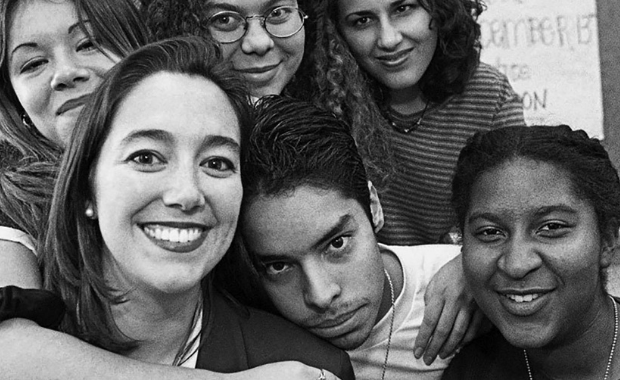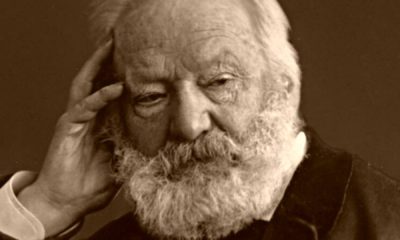Life
10 Remarkable Lessons From an Unconventional School Teacher

Erin Gruwell is the founder of The Freedom Writers Foundation, created to inspire and show young people a better way of life. An educator by profession, she has worked with high school students and inspired change through her unique teaching methods.
The movie Freedom Writers is based on her teaching experience that led to the creation of the Freedom Writers Foundation. It’s an inspirational movie about how 150 students turned their lives around, who today are inspiring others to do the same.
Here are 10 practical lessons from the movie that can change your own life:
1. Be relevant
The education system worldwide is a broken one and most of what is taught doesn’t add value to students’ lives. In some ways, it’s designed to create slaves of its recipients that never learn to think for themselves. Only when Erin Gruwell connected with her students at Woodrow Wilson at a deeper level, was she able to make a difference.
By altering her curriculum and teaching what they could relate to, she finally got their attention and made an impact. Her students came alive and started to view their lives and situations in a more positive light.
2. Writing is therapeutic
The common factors among Erin’s students were emotional pain and insecurity that was often expressed through violence and hatred. Gang violence was a way of life in Long Beach California during those times between different races. Such a life felt hopeless for the young people who saw no bright future for themselves.
This was compounded by seeing their friends getting killed through gang violence. Erin came up with an idea for her students to journal whatever they were feeling. She got them journals and as they wrote, it became a healing experience that helped them see things differently.
“I realized if you can change a classroom, you can change a community, and if you change enough communities, you can change the world.” – Erin Gruwell
3. Life isn’t just about money
It’s a deception that success in life is mainly about making a lot of money and living a flashy lifestyle. Most people spend most of their lives chasing after that dream but find it doesn’t bring lasting happiness. Erin’s dad had wanted her to take up a better-paying career instead of teaching which he felt was too menial for her.
Real success has to do with adding value and making a difference in other people’s lives. If you do it right and consistently, avenues to make money and have a better lifestyle will open up. Today Erin runs The Freedom Writers Foundation which empowers other teachers to make a difference in their students’ lives. Her track record has awarded her various opportunities to share her story through various platforms.
4. Balance is important
Given the impact she has made all these years, it’s easy to tell that she loves teaching. The sad part about her story is that her success came at the expense of her marriage. Her husband often felt neglected because Erin spent most of her time with her students, forgetting to make time for him too.
Success isn’t worth it if you can’t share it with those closest to you. It’s often a challenge for highly motivated people to strike a balance but it must be done intentionally nonetheless. They may not have been a good match but divorce, however, is never pretty. Maybe she could have struck a balance between her husband and work and still be married today.
5. Believe in your dream
The most powerful dreams often don’t make sense before they become a reality. Erin’s motivation for taking up the teaching job at Woodrow Wilson High School was the integration program. Most of the teachers felt it was a lie and impossible to achieve due to all the gang violence.
Erin went the extra mile many times to break new ground and show her students what was possible. Your God-given dreams only make sense to you until you show others that they can be real. You therefore shouldn’t get discouraged if people misunderstand you.
6. Turn negatives into positives
The painful experiences of Erin’s students culminated in them publishing The Freedom Writers Diary, a compilation of their journals. Having read the book myself, it was painful just reading about what they went through as young people. On the bright side, myself and others who read it, got inspired to overcome the obstacles in our own lives.
The sales from their book were channeled towards funding their college education after graduating high school. It goes to show that even your mistakes can be used for something positive. Those same students went on to work with Erin in the Freedom Writers Foundation to share their message with students around the country.
7. Lack of experience doesn’t have to stop you
Erin’s designation at Woodrow Wilson was her first teaching job and she only spent four years there. She accomplished a lot more than other teachers who had been there for decades. Experience certainly helps but doesn’t have to be the only thing that qualifies you to take on big assignments.
Learn from those in your field but don’t use their success as a measure for what you can accomplish. You’re unique and that means you can do certain things in ways that others can’t. Bring your flavor to the table and see the beautiful things that you can create.
8. There’s more that unites us than divides us
Despite their cultural differences, Erin’s students came to realize that they were the same at the core. The hatred they had towards each other blinded them to this truth for a long time until they let it go. It took Erin’s guidance to help them see that and foster a sense of unity among them.
The more united people become, the more they can accomplish together. On a personal level, think about the people you somewhat despise and choose to see their positive side. The differences serve to help you see things from a different perspective while working towards a common goal.
“Be the kind of people that have enough passion to change the world. If we let ourselves be fire, thunder, or lightning, we could alter everything.” – Erin Gruwell
9. Potential is immeasurable
I doubt that Erin could have imagined what she would accomplish with her students that society had written off. For a long time, it was always expected that most students would never graduate; either because they’d give up or die through gang violence. All of Erin’s students went on to graduate from high school which was a tremendous achievement. In the same way, you can’t predict what you can accomplish until you step out in faith and pursue your God-given dreams.
10. Be true to yourself
At the end of the day, Erin Gruwell lives a fulfilling life because she’s pursued what she was created for. God has a great plan for your life and even if it doesn’t always make sense, believe in it. You sell yourself short when you allow other people to create your life for you, and it brings regrets.
Did You Know
How Skilled Migrants Are Building Successful Careers After Moving Countries
Behind every successful skilled migrant career is a mix of resilience, strategy, and navigating systems built for locals.

Moving to a new country for work is exciting, but it can also be unnerving. Skilled migrants leave behind familiar systems, networks, and support to pursue better job opportunities and a better future for their families. (more…)
Life
10 Research-Backed Steps to Create Real Change This New Year
This New Year could finally be the one where you break old patterns and create real, lasting change.

Every New Year, we make plans and set goals, but often repeat old patterns. (more…)
Life
9 Harsh Truths Every Young Man Must Face to Succeed in the Modern World
Before chasing success, every young man needs to face these 9 brutal realities shaping masculinity in the modern world.

Many young men today quietly battle depression, loneliness, and a sense of confusion about who they’re meant to be.
Some blame the lack of deep friendships or romantic relationships. Others feel lost in a digital world that often labels traditional masculinity as “toxic.”
But the truth is this: becoming a man in the modern age takes more than just surviving. It takes resilience, direction, and a willingness to grow even when no one’s watching.
Success doesn’t arrive by accident or luck. It’s built on discipline, sacrifice, and consistency.
Here are 9 harsh truths every young man should know if he wants to thrive, not just survive, in the digital age.
1. Never Use Your Illness as an Excuse
As Dr. Jordan B. Peterson often says, successful people don’t complain; they act.
Your illness, hardship, or struggle shouldn’t define your limits; it should define your motivation. Rest when you must, but always get back up and keep building your dreams. Motivation doesn’t appear magically. It comes after you take action.
Here are five key lessons I’ve learned from Dr. Peterson:
-
Learn to write clearly; clarity of thought makes you dangerous.
-
Read quality literature in your free time.
-
Nurture a strong relationship with your family.
-
Share your ideas publicly; your voice matters.
-
Become a “monster”, powerful, but disciplined enough to control it.
The best leaders and thinkers are grounded. They welcome criticism, adapt quickly, and keep moving forward no matter what.
2. You Can’t Please Everyone And That’s Okay
You don’t need a crowd of people to feel fulfilled. You need a few friends who genuinely accept you for who you are.
If your circle doesn’t bring out your best, it’s okay to walk away. Solitude can be a powerful teacher. It gives you space to understand what you truly want from life. Remember, successful men aren’t people-pleasers; they’re purpose-driven.
3. You Can Control the Process, Not the Outcome
Especially in creative work, writing, business, or content creation, you control effort, not results.
You might publish two articles a day, but you can’t dictate which one will go viral. Focus on mastery, not metrics. Many great writers toiled for years in obscurity before anyone noticed them. Rejection, criticism, and indifference are all part of the path.
The best creators focus on storytelling, not applause.
4. Rejection Is Never Personal
Rejection doesn’t mean you’re unworthy. It simply means your offer, idea, or timing didn’t align.
Every successful person has faced rejection repeatedly. What separates them is persistence and perspective. They see rejection as feedback, not failure. The faster you learn that truth, the faster you’ll grow.
5. Women Value Comfort and Security
Understanding women requires maturity and empathy.
Through books, lectures, and personal growth, I’ve learned that most women desire a man who is grounded, intelligent, confident, emotionally stable, and consistent. Some want humor, others intellect, but nearly all want to feel safe and supported.
Instead of chasing attention, work on self-improvement. Build competence and confidence, and the rest will follow naturally.
6. There’s No Such Thing as Failure, Only Lessons
A powerful lesson from Neuro-Linguistic Programming: failure only exists when you stop trying.
Every mistake brings data. Every setback builds wisdom. The most successful men aren’t fearless. They’ve simply learned to act despite fear.
Be proud of your scars. They’re proof you were brave enough to try.
7. Public Speaking Is an Art Form
Public speaking is one of the most valuable and underrated skills a man can master.
It’s not about perfection; it’s about connection. The best speakers tell stories, inspire confidence, and make people feel seen. They research deeply, speak honestly, and practice relentlessly.
If you can speak well, you can lead, sell, teach, and inspire. Start small, practice at work, in class, or even in front of a mirror, and watch your confidence skyrocket.
8. Teaching Is Leadership in Disguise
Great teachers are not just knowledgeable. They’re brave, compassionate, and disciplined.
Teaching forces you to articulate what you know, and in doing so, you master it at a deeper level. Whether you’re mentoring a peer, leading a team, or sharing insights online, teaching refines your purpose.
Lifelong learners become lifelong leaders.
9. Study Human Nature to Achieve Your Dreams
One of the toughest lessons to accept: most people are self-interested.
That’s not cynicism, it’s human nature. Understanding this helps you navigate relationships, business, and communication more effectively.
Everyone has a darker side, but successful people learn to channel theirs productively into discipline, creativity, and drive.
Psychology isn’t just theory; it’s a toolkit. Learn how people think, act, and decide, and you’ll know how to lead them, influence them, and even understand yourself better.
Final Thoughts
The digital age offers endless opportunities, but only to those who are willing to take responsibility, confront discomfort, and keep improving.
Becoming a man today means embracing the hard truths most avoid.
Because at the end of the day, success isn’t about luck. It’s about who you become when life tests you the most.
Change Your Mindset
The Four Types of Happiness: Which One Are You Living In?
Most people chase success only to find emptiness, this model reveals why true happiness lies somewhere else.

In a world driven by rapid technological growth and constant competition, many people unknowingly trade joy for achievement. (more…)
-

 Health & Fitness1 week ago
Health & Fitness1 week agoWhat Minimalism Actually Means for Your Wellness Choices
-

 Did You Know6 days ago
Did You Know6 days agoWhy Most Online Courses Fail and How to Fix Them
-

 Business6 days ago
Business6 days agoIf Your Business Internet Keeps Letting You Down, Read This
-

 News2 days ago
News2 days agoBrandon Willington Builds 7-Figure Business by Ignoring Almost Everything

























